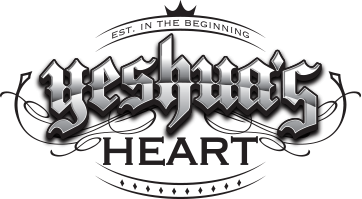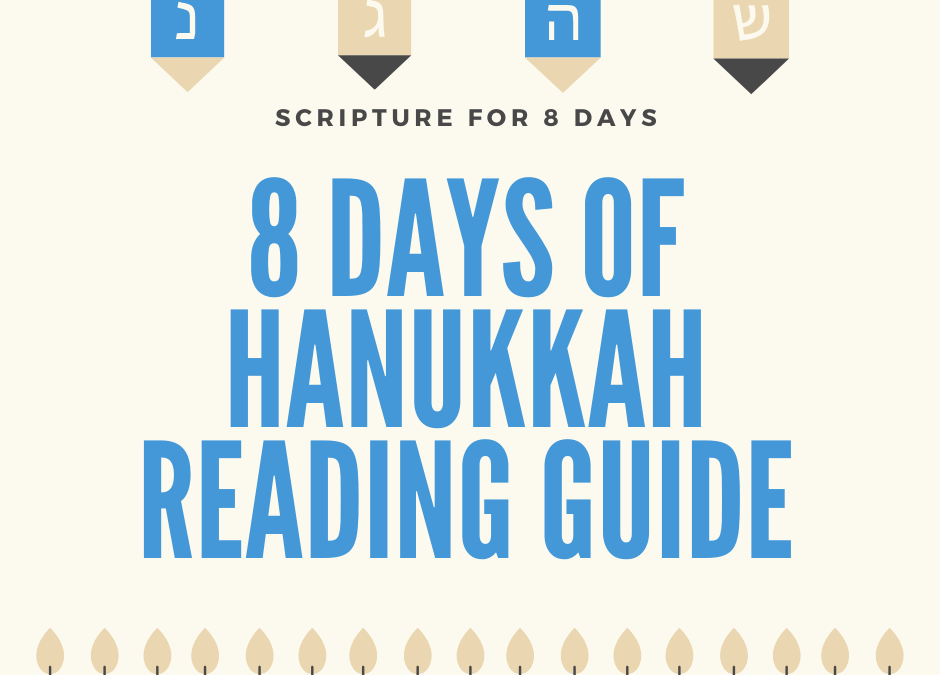Hanukkah Reading Guide:
8 days of Devotionals for Historical and Scriptural Learning
The story of Hanukkah teaches us about a small group of men led by the example of their patriarch Mattathias, and then his son, Judah the Hammer (Maccabee) who were dedicated to God, intent on observing His commandments, living His Word, and serving Him in His holy Temple.
This ancient family resisted the ways of the Greek/Syrian influence on their society. They eventually overcame their overlords and re-dedicated the temple back to God. We can learn from this family today by resisting the ways of this world and dedicating ourselves as temples to God.
Unlike the Feasts of the Lord (Passover, Unleavened Bread, First Fruits, Shavuot aka Pentecost, Day of Trumpets (Yom Teruah), Day of Atonement (Yom Kippur) and Sukkot aka Tabernacles; Hanukkah is exclusively a Jewish National Holiday. Since our messiah was Jewish, he went up to temple during the celebration as recorded in scripture. At no time does he condemn the holiday, and we want to walk as he walked, therefore we too celebrate the festival as a time to read the word and dedicate ourselves to God.
Use this guide for family reading and discussion. We suggest having each day’s scripture or reading bookmarked and ready to share.
Day 1-
Jesus (his name in Hebrew is Yeshua) went up to the Temple during Hanukkah. The word Hanukkah means “dedication” and it was known as the “Feast of Dedication”, a Jewish national celebration to commemorate the victory over the Greeks as well as the reclaiming and re-dedication of their Temple.
Jesus used this celebration, and the fact that so many people would be there to declare himself the “Light of the World” and establish that he is Messiah.
Read John 10:22-30, John 8:12, John 9:5
Day 2-
The story of this revolt is in the book of 1 Maccabees, especially chapter 4. Feel free to read this as extra-biblical resource for understanding the political times.
Currently, the national anthem of Israel is called the Ha Tikvah, it means “The Hope” It is based on a poem written in 1886. Play the Hatikvah, Joshua Aaron has a good version.
Day 3-
Dreidel is a game played by Jewish people all over the world which dates back to the time of the Maccabees. Traditionally the four-sided dreidel has the Hebrew letters: Nun, Gimel, Heh, and Shin. The game serves as a reminder of the Hanukkah miracle, and the letters represent the phrase Nes Gadol Haya Sham or “A great miracle happened there. In Israel, on all the dreidels the Shin is replaced with a Pey, which changes the phrase to Nes Gadol Haya Po or “A great miracle happened here.”
Because Antiochus Epiphanes, the leader who conquered Jerusalem outlawed Torah study and assembly, Jews had to study in secret. If they were caught assembled, the story goes that they would pull out a dreidel and pretend to be gambling instead of studying. That tradition is why children play dreidel with chocolate money. There is no actual account of this happening, but the tradition holds.
The game of dreidel is not actual gambling, it’s a game of happenstance where you give or get chocolate coins based on the outcome of the dreidel landing, like flipping a coin. There is no betting or speculation.
Day 4-
Read Daniel Chapter 8. Daniel 8 starting at verse 3 tells the prophesy of Hanukkah. It tells the story of how Judah will be defeated by a type of anti-Christ, known as the “abomination of desolation”. In this passage the goat represents Greece, the ram is Medo-Persia. It tells of the rise of Alexander the Great, who’s horn is broken, as he dies at a young age, cut down in his prime.
His empire is split into 4 new horns (Kingdoms). One of these is Syria, a little horn, and out of it came this type of anti-Christ, Antiochus Epiphanes who thought himself a god.
Read Daniel 11: 31-32.
These things happened because God’s people were disobedient. But a remnant was obedient and took action. In Hebrew culture and all throughout the scripture we see historical events in a circular pattern (Ecclesiastes 1:9) These things will happen again at the end of days. We will know what to look for.
Day 5-
Read Matthew 24: 15-27.
Matthew confirms the prophesy of Daniel and reminds us that these things will happen again at the end of days. “Let the reader understand” eludes to Ecclesiastes 1:9, “there is nothing new under the sun”, confirming God’s circular patterns in history.
What is interesting is that Matthew’s statement confirms that in verse 20, God will be expecting his set apart people to be keeping Sabbath at the end of days. Read Revelation 12:17
Day 6-
What is a Menorah?
A menorah is a 7 branched lamp stand that God commanded to be created to illuminate his set apart temple. Read Exodus 25:31-40.
Why did God want it beaten and not caste in a mold? Casting gold is much easier than hand beating into the shape you want. However, the beaten hand-crafted gold product is much stronger than caste gold. We are told to be a light, as God is a light. I think God uses this as a metaphor to craft us into a stronger lamp stand to be a light for God.
What is a Hanukkiah?
This is a 9 branched lamp stand. It is to commemorate the “miracle” of 8 days of lamp oil. It has 8 branches for each of the 8 days of the celebration, and one branch that stands higher than the others. It is called the Shamash or “servant” candle. It is used to light all the other ones.
We can use this as an object lesson: Single out the Shamash, the servant candle, you use to light the rest of the candles.
Point out that the Shamash pictures the Messiah. This special candle is used to give the other candles their light. In the end, it is given a separate place, a place of honor. So it is with us who are servants of Messiah: we are to give ourselves to Him for His use, and when He returns He will give us honor!
Read John 8:34-36 and Romans 6:11-23
Day 7-
There is good historical evidence that the Hanukkah legend concerning the miracle of the burning oil never happened! The story says that when the Jewish people wanted to light the great menorah in the newly dedicated Temple during the Maccabean revolt, there was only enough oil to last one day. But God did a miracle! He caused the oil to last eight days, long enough to purify more oil.
The problem with the above story is that none of the most ancient sources for the history of Hanukkah (I, II Maccabees and Josephus) mention the above miracle. That does not mean that it never happened. It just means that the earliest and best sources for the history of Hanukkah never mention it.
The miracle is first mentioned in the Talmud, compiled about five or six hundred years after the first Hanukkah. Talmud is part of Rabbinical writings and statutes known as the “oral Torah” and is not actual law from God, rather “traditions of men”.
Having said that this miracle of the light probably never happened, does not mean that there was no miracle at Hanukkah. Indeed, there was a great miracle! It was both a spiritual and a military miracle.
First, the greatest miracle was that in that increasingly assimilating and Hellenistic (worldy) Jewish society, there rose up a family of faithful Torah-observant, God-fearing Jews who made a courageous stand against those who were ignoring the Covenant of God.
But not only did Mattathias encouraged his own family to live for the Lord, they also, in turn, were able to inspire others in their nation to do so. In the end, God honored that courage and that dedication to Him.
The second miracle came on the battlefield. The Maccabees and their followers were vastly outnumbered, out-equipped, and out-trained by their Antiochian enemies. Yet, through courage, smart tactics and faith in their God, the Lord granted them the miraculous military victory they needed.
What about the eight days? Hanukkah was celebrated for eight days, not necessarily because of a supposed miracle of oil, but because as the Maccabees hid in the hills and bravely fought the enemies through their guerrilla warfare, they were not able to celebrate Sukkot. Therefore, when they celebrated their victory in Jerusalem, they included in their celebrations the eight-day celebration of Sukkot.
Back to our initial question: what was the real miracle at Hanukkah? The answer is that God granted both a spiritual and a military victory to those who were dedicated to Him. As we celebrate Hanukkah, what other miracles can we remember? What other great works has the Lord done for which we can sing praises to Him?
Day 8-
So to recap the festival and it’s deeper spiritual meaning: Jesus (Yeshua) was at temple during the Feast of Dedication declaring he is the light of the world, and like him we are told to be a light to the world.
Read Genesis 1:4, John 9:5, Phillipians 2:15-16, Isaiah 42:6, Proverbs 6:23, Psalm 119:105, 1 John 1:5, Matthew 5:14, Luke 8:16, Ephesians 5:8
Like the physical temple, our bodies are spiritual temples and should be dedicated to God: Read 1 Corinthians 6: 19-20.
References:
Holy Bible
1 and 2 Maccabees
Josephus
Messianic Fellowship


